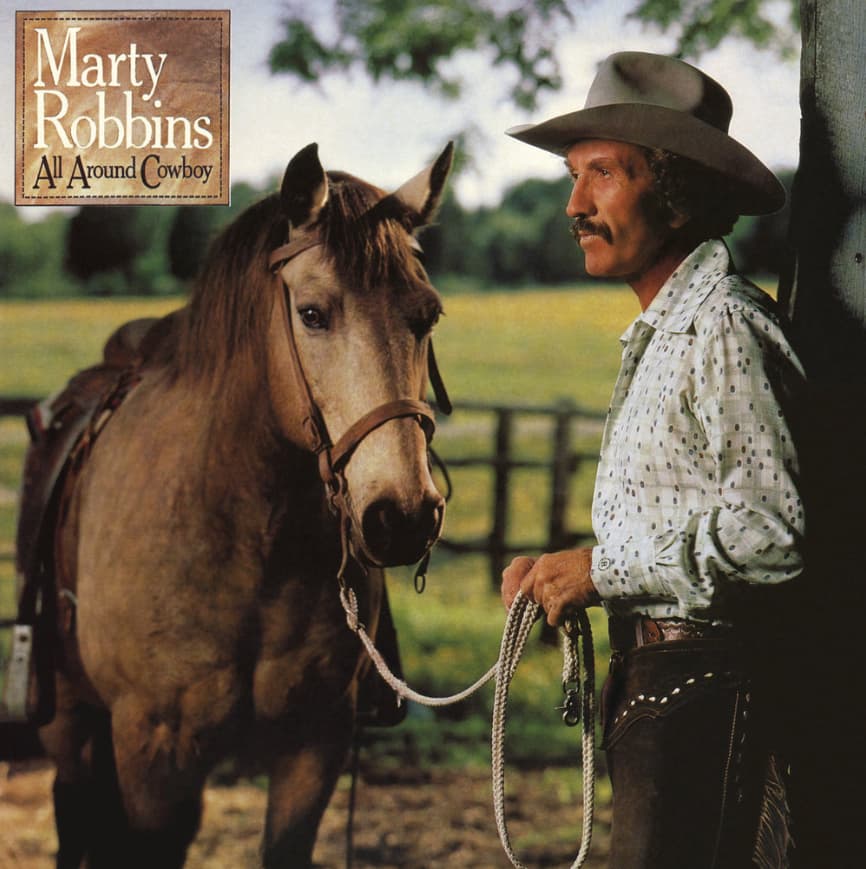
Marty Robbins’ “All Around Cowboy”: A Late-Career Gallop Back to the Dust of the Trail
Oh, to hear that familiar, resonant baritone again, drawing us back to a simpler time, a landscape painted in sun-baked earth and infinite blue skies. The year was 1979, and for many of us, the sound of country music was beginning to change, leaning towards new production styles and themes. Yet, with the release of the album and title track “All Around Cowboy,” Marty Robbins gifted us one last, beautiful, and authentic return to the Western mythos he had so brilliantly championed two decades earlier. It felt like a warm, comforting reunion with an old friend who remembered exactly where we came from.
This song, a gentle yet confident narrative, was a welcome reminder of the storytelling prowess that cemented Robbins as a true legend of the genre. The single, released in May 1979, proved that the appetite for classic Western narratives remained strong, charting on the Billboard Hot Country Singles chart where it peaked at #16. While perhaps not reaching the dizzying heights of his earlier iconic ballads like “El Paso” or “Big Iron,” a Top 20 hit so late in his career, especially with such a traditional Western song, speaks volumes about his enduring appeal and the loyalty of his audience—an audience that cherished those vivid, cinematic tales of the open range. The album of the same name, All Around Cowboy, also made a respectable showing, reaching #45 on the Billboard Top Country Albums chart.
The story behind “All Around Cowboy” is less about a dramatic, gun-slinging duel and more about a quiet affirmation of a way of life. Written and recorded by Marty Robbins himself, the song is a self-portrait, or perhaps a gentle, wistful look at the kind of man he loved to embody in his music. It’s the simple, yet profound meaning of the track that truly resonates with us now. The “all-around cowboy” isn’t the fastest gun or the rowdiest drinker; he is, quite simply, competent and dependable. He’s the man who can ride, rope, mend a fence, and knows the land like the back of his hand. It’s an ode to the virtue of capability and humility, a nod to the solid, unpretentious man of the West—the kind of character that many of us, growing up in those days, admired and aspired to be, or at least respected deeply.
Listening to it today, one can’t help but feel a profound wave of nostalgia. This was more than just a song; it was a connection to a shared cultural memory, a time when the Western was still a dominant force in our entertainment and imagination. Robbins sings with a familiar warmth, the arrangement is clean, featuring those subtle, signature elements of Southwestern flavor he often incorporated. He wasn’t just singing about a cowboy; he was, in that moment, inviting us back to the bunkhouse, to sit by the fire under a vast, silent sky, and listen to a story told with sincerity and heart.
The song’s release was particularly poignant because, in the late 70s, many of the old guard of country and Western music were either retiring or trying to adapt to the “Outlaw” movement and the beginnings of country-pop. Robbins, ever the versatile performer, had dabbled in different styles over the years, but with this album, and this title track, he reaffirmed his lifelong commitment to the classic Western ballad. It was a beautiful, almost defiant, assertion that the stories of the trail still mattered. For those of us who grew up on the romance of the Old West, his return to this theme felt like a final, heartfelt embrace—a sweet song of the plains from a voice that, tragically, would be silenced just a few short years later in 1982. It is a timeless piece, embodying the quiet dignity of the working man and the enduring, mythic power of the American West, all delivered by a master storyteller whose voice we will never forget.